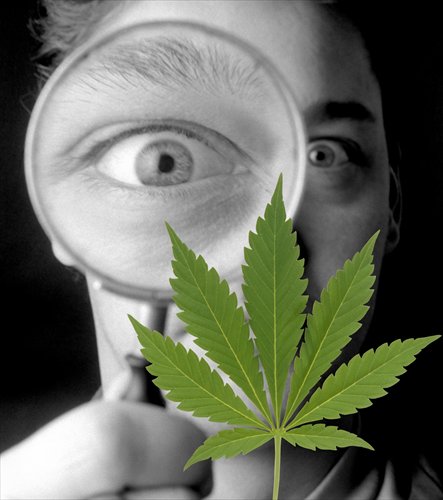Marijuana in China
Ubiquitous in the West, cannabis is now catching on in China

The recent string of celebrity arrests for cannabis use in China has led many to take a closer look at the drug and its effects. Photo: IC
A darkened room. A dangling disco ball. A kaleidoscope of colored lights dancing dizzily on the walls. Music so loud you can't hear your own thoughts.
Slack-faced smiles. Long plumes of smoke.
Roll another joint.
Five years ago, this was a typical night out for 24-year-old Jing Jing (pseudonym). She had just begun university in Beijing. She had always been mad about music, and so she found herself at parties where there would be music.
At one such party, someone passed along a hand-rolled cigarette.
"At first, I didn't know it was weed [cannabis]," said Jing. "It looked like a normal cigarette. A stranger handed it to me, and I smoked it."
It did not take her long to realize she was not just smoking tobacco.
"Weed magnifies all your senses," said Jing. "For example, your hearing becomes highly attuned, as good as a dog's. And the same with your other senses, like taste, sight, and smell."
Jing has long since stopped smoking cannabis, but she said that parties for people to get together and use the drug were common in Beijing.
She was invited to one such party just last Friday, and although she no longer uses the drug herself, she does not object to its recreational use.
"[Using cannabis] isn't a big deal," said Jing. "It's legal in quite a few countries. Only in China is it viewed with such disapproval."
Jing's attitude can be seen as indicative of a growing number of Chinese youth towards recreational drug use, in particular cannabis.
According to a recent CPC News report, recreational drug use is rising steadily in Beijing, with around 7,800 arrests made in relation to illegal drug use.
The report added that many of those arrested were in their teens, 20s or 30s.
The most common psychoactive effects of cannabis, according to a 2010 Harvard University paper titled "Medical Marijuana and the Mind," include altered conscious perception, euphoria, reduction of stress, heightened introspection, increased appetite and increased libido. The most common side effects of cannabis use are anxiety and paranoia.
The combination of these effects is known colloquially as "getting high."


Although the manufacture or trafficking of marijuana can carry a maximum penalty of death in China, penalties for simply using the cannabis are relatively minor. Photos: IC
Cannabis in China
Public awareness of recreational cannabis use in China has escalated recently due to the high profile arrests of Hong Kong actor and singer Jaycee Chan (the son of Jackie Chan) and Taiwanese actor Kai Ko for possession of the drug.
The fallout from the arrests has seen a flurry of posts from some fans of the two celebrities, criticizing Chinese laws prohibiting the recreational use of cannabis as too strict. Such posts suggested that recreational use of cannabis was legal in the West, and that China's laws were out of line with international trends.
Although it is true that recreational use of cannabis is more widely tolerated in the West, it is inaccurate to say that it is legal. Even in places like the Netherlands, in which the idea that cannabis has been legalized is widely perpetuated, it is more accurate to say that it has been decriminalized, as per a 2007 report published by the European Monitoring Center for Drugs and Drug Addiction. This means that although widely tolerated, and not considered a criminal offence, the sale and use of cannabis are still subject to regulatory measures, including confiscation.
Rather, the perception by Chinese youth that cannabis has been widely legalized more likely comes from the fact that it is widely used in the West.
In the West, recreational cannabis use has been well-documented since its use by the beat generation in the 1950s and the hippie movement in the 1960s. The Washington DC-based Marijuana Policy Project suggests that more than 40 percent of the US population born since 1960 have used the drug at least once. Its ubiquity in the Western cultural consciousness can be seen by the number of epithets it is commonly known by, including marijuana, weed, pot, hash and Mary Jane.
In 1964, Israeli scientist Raphael Mechoulam identified Tetrahydrocannabinol (THC) as the principal psychoactive component of cannabis, and not long after, it was classified as an illicit substance in the US under the Controlled Substances Act of 1970 until now.
Shi Jianchun, the deputy director of Beijing Educational Base for Forbidding Narcotic & Hallucinogen, said that cannabis, in being comparatively cheap and easy to acquire, posed a high risk of exposure and addiction. Shi added that those most at risk were those who worked in the entertainment and media industries, and youth living on the urban fringes.
Yang Bin, the secretary-general of Volunteers of China Narcotics Control, further warned that the risk of using cannabis was that it is often laced in ordinary cigarettes.
"It is hard to identify whether a cigarette also contains cannabis," she said.
In the West, a cigarette that are rolled with both tobacco and cannabis is commonly known as a "joint" or a "spliff."
Regulatory measures
Although there is strong social condemnation against the taking of cannabis in China, national regulations governing the use and possession of cannabis in small quantities are mostly in line with a large number of other countries.
Although illegal, use of cannabis or any other narcotic in China is not considered a criminal offence, and carries a maximum penalty of 15 days detention and a 2,000-yuan ($325) fine under The Regulations of the People's Repulic of China on Administrative Penalties for Public Security.
"Smuggling, transporting, trafficking or manufacture" of cannabis is, however, considered a criminal offence under Article 357 of the Criminal Law, and carries a maximum penalty of death.
One difference between the regulation of cannabis in China and in some other parts of the world is that Chinese law makes no distinction between cannabis and other drugs deemed to be illegal. In contrast, a large number of other countries have specific regulations regarding the use, possession, and sale of cannabis, including the Netherlands, Belgium, Switzerland, Argentina, and certain states in the US and Australia.
In a number of cantons in Switzerland, for example, the cultivation of cannabis plants for personal use is legal, with the reasoning being that it will prevent trafficking of the drug and its associated criminal activities.
There are also a number of countries in which the possession or use of marijuana is "de facto decriminalized," meaning that although it remains illegal under a strict interpretation of the law, it is widely tolerated.
These countries include Germany (Section 31a of the Narcotics Act), and Costa Rica (according to a report in national newspaper La Nación).
A gateway drug?
One of the reasons for the strong social stigma attached to using cannabis recreationally in China is its reputation as a gateway drug.
Gu Xiaonan (pseudonym) started smoking cannabis eight years ago, when still a teenager. Like many of his peers, he did not think much of his habit. But as he smoked more and more, he began to yearn for a higher "high," which lead him to try methamphetamines, or "meth."
"He smoked meth for about one year," recalls his girlfriend, Song Xi (pseudonym). "In the first week he started, he lost 15 kilograms of weight."
"If he hadn't stopped eventually, he might have gone on to take even harder drugs, and completely ruined his life."
When Gu quit, he had to cut off contact with all the friends with whom he took the drug. And although he now describes the period in lighthearted tones, Song said that there are moments where he has withdrawal symptoms.
"After he quit meth, he became seriously addicted to cigarettes," said Song. "He couldn't go three hours without smoking. But his weight bounced back to 90 kilograms, and he's slowly gaining more."
"One of the most important reasons for us to oppose the legalization of cannabis in this country is that people who start with cannabis may go onto more serious drugs," said Shi. "It begins with cannabis. Then comes meth, then heroin, step by step moving towards self-ruination and death."